War on Water: A Clash Over Oil, Power and Poverty in the Niger Delta
Thousands Search for Fresh Water, Food in a Monumentally Contaminated War Zone
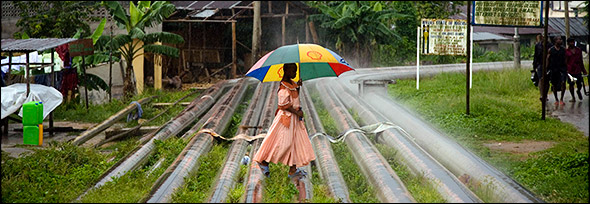 Oil pipelines create a pathway for this young woman through the village of Okrika Town, Nigeria. Photo by Ed Kashi. Click image to enlarge.
Oil pipelines create a pathway for this young woman through the village of Okrika Town, Nigeria. Photo by Ed Kashi. Click image to enlarge.by Aubrey Ann Parker
Photographs by Ed Kashi
Circle of Blue
UPDATE: Click here to listen to Ed Kashi’s complete interview.
A fierce armed clash between an aggressive guerrilla militia and the Nigerian military over control of Nigeria’s oil wealth is forcing thousands of residents to evacuate their homes and trek through one of the world’s largest wetlands, now monumentally contaminated with oilfield wastes.
The fighting began two months ago, pressed by militants frustrated with how Nigeria’s oil wealth is hoarded by the wealthy and the government. And while the central issues are greed, poverty, power and pollution, the principal victims are the tens of thousands of Niger Delta residents whose lives are endangered not only by the fighting, but also by the toxins, industrial wastes and oil-slicks that are poisoning their drinking water and contaminating the fish they rely on for food.
“It always ends up that the people get caught in the middle. These small villages in the creeks, they’re under threat from both sides,” said Ed Kashi, photographer of Curse of the Black Gold: 50 years of Oil in the Niger Delta and for National Geographic who has closely studied the region. “There’s no good guys, here. They’re all bad guys, just varying degrees from different perspectives.”
A Flood of Refugees
According to international news accounts, thousands of residents have fled the Niger Delta on foot in fear of either side mistaking a civilian boat for the opposition. Some have made it across Africa’s largest wetland to neighboring cities, well out of the way of the military’s indiscriminate helicopter gunfire and torching raids on communities believed to be harboring rebels.
Others less fortunate are still trapped in the series of canals and tributaries that cross the Niger Delta — sleeping in oil contaminated mangrove swamps without shelter, medical care, food or water. The military has restricted access to the region to flush insurgents out of their stronghold. The only way in or out of many villages in the Niger Delta is by open boat. The transportation embargo is choking bottled water supplies — a necessity in a region where water is undrinkable because of indiscriminate industrial practices.
There are no heroes in the fight, say residents and authorities. The militant group Movement for the Emancipation of the Niger Delta (MEND) is calling its latest attacks on multinational oil companies like Shell, Chevron, and Agip, “Hurricane Moses.” Surely referencing the biblical phrase, “Let my people go,” the self-proclaimed freedom fighters have declared an “all out war” aimed at procuring rights for the 30 million impoverished people in the Niger Delta — 70 percent of whom are living on less than $1 per day.
War Accelerates Contamination
But many observers say MEND’s strategy and tactics — blowing up pipelines and destroying equipment — are exacerbating the environmental damage already in progress and making it harder for the very people MEND claims to protect.
Since May 13, the Nigerian government has charged the Joint Task Force (JTF), a special branch within the military, with securing the region. The government forces are firing on some homes and burning others as they attempt to root out rebel forces.
“It is the equivalent of gang warfare over turf and control, and instead of crack cocaine it’s oil, and instead of being on the main streets of a city, it’s out on rivers and creeks on small boats,” Kashi said.
Nigeria is Africa’s largest exporter of crude oil, and as recently as 2008 produced 2.1 million barrels per day — seventh in the world — according to the Energy Information Administration, a unit of the U.S. Department of Energy. OPEC estimates Nigerian oil reserves at 36.22 billion barrels and the industry makes up 95 percent of the country’s exports, 80 percent of its budgetary revenue, and around 40 percent of its GDP. Income from the 2.1 million barrels of oil that Nigeria exports daily is controlled by the federal government, and only 13 percent is distributed to and split between the nine oil producing states in the Niger Delta.
Nothing Trickling Down
Despite an estimated $600 billion in oil revenue since its discovery in 1956, the money does not appear to be economically trickling downstream. Many villages in the area do not have electricity or running water. A recent report by Chevron found that per capita income in Nigeria reached $294 a year in 2007. Living standards for most Nigerians are no better today than they were in the 1960s, at the start of the Niger Delta oil boom.
“When you have the backdrop that there is so much wealth being generated from this area, that is where, to me, the criminality is unacceptable. Where is it all going?” Kashi asked.
Since its formation in 2006 MEND has taken more than 200 oil workers hostage and reduced Nigerian crude oil production to 1.5 million barrels per day. Sabotage in the Niger Delta oil industry has become a daily occurrence followed closely by global energy traders because of the effect on international oil prices. In the last two months alone, Shell, Chevron and Agip have shut in more than 300,000 barrels per day to prevent losses and further environmental damage.
Oil Wastes
While the world worries about the oil supply, Niger Delta residents fight for access to safe drinking water and sanitation. Oil spills were frequent before the clash. Pollution has been endemic. According to the United Nations more than 6,800 spills were recorded between 1976 and 2001. A Nigerian government study identified 2,000 contaminated sites in the region.
“Certainly, drinking water is a problem in the Niger Delta,” said Peter Nwilo, of the Department of Surveying and Geoinformatics at the University of Lagos, Nigeria. “It is difficult to get water from the streams. It has to be from deep holes. It is a difficult environment in terms of water. Upland you can get streams that are clean, that you can drink, but that is not the kind of thing in the Niger Delta. Because, even if there is no oil spill, you have salt water.”
One drop of oil can make up to 25 liters of water undrinkable. Last month, Amnesty International reported that residents of the Niger Delta bathe in and drink oil-contaminated water. Additionally, a half-century of petroleum pollution decimated fish populations that were the primary source of protein for these communities for generations.
According to a May 2006 joint study by the Nigerian Federal Ministry of Environment, the Nigerian Conservation Foundation and several environmental organizations, 9 million to 13 million barrels have spilled during the history of oil production in the Niger Delta — the equivalent of a spill the size of the Exxon Valdez every year for the last fifty years.
In one study on oil-spill management that Nwilo co-authored, half of the oil spills between 1976 and 1996 were due to corrosion of pipelines and storage tanks, while 28 percent were caused by sabotage. When asked how this has changed with the recent fighting, Nwilo told Circle of Blue, “Oil spills are now caused by sabotage due to militancy activities in the Niger Delta. Pollution due to corrosion has substantially reduced because the aging pipelines have been replaced.”
Spills by sabotage and oil bunkering are not new concepts to the Niger Delta. Shell says that “about half [of its worldwide] total volume spilled in 2008 was caused by one sabotage incident in Nigeria, where a large pipeline was damaged by explosives.”
Military Restrictions
While each side of this battle claims to purge the area of oil-pilfering tyrants, civilians are forced to flee their homes and wade through creeks of oil-stained waters. Amnesty International estimates hundreds of civilian casualties and thousands displaced since May, and places the blame on both the JTF and MEND. These figures cannot be verified, though, as the military is not granting the majority of humanitarian groups or the media access to the affected area.
“Nobody can get into the areas where they’ve been fighting in Delta State; journalists, foreigners, even locals. Therefore there is no accurate reporting of what’s going on in the area that is hot with fighting,” Kashi said.
Military restrictions on transportation are choking supplies of bottled water, a necessity in an area struggling from decades of pollution. “Out where the fighting is going on, there is no infrastructure,” Kashi added. “It’s buckets of water from the river.”
“While this dance is going on,” Kashi said, “this charade, this puppet show, whatever it is, some of it is quite lethal and serious. Ultimately, the people just continue to be trashed here and get no benefit or improvement in their daily lives.”
Aubrey Ann Parker, an undergraduate student at the University of Michigan, is an intern at Circle of Blue where she specializes in data visualization. Reach her at circleofblue.org/contact.
is a Traverse City-based assistant editor for Circle of Blue. She specializes in data visualization.
Interests: Latin America, Social Media, Science, Health, Indigenous Peoples

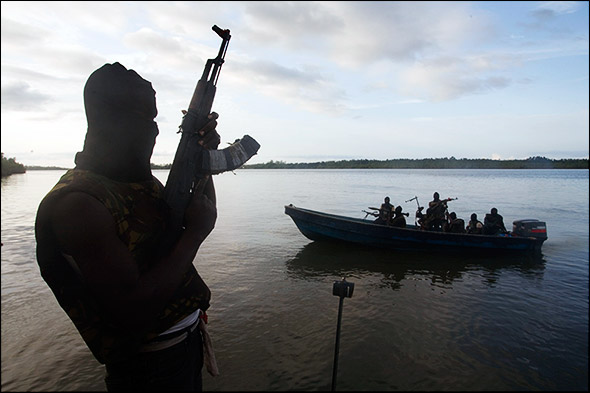
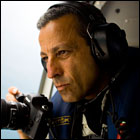
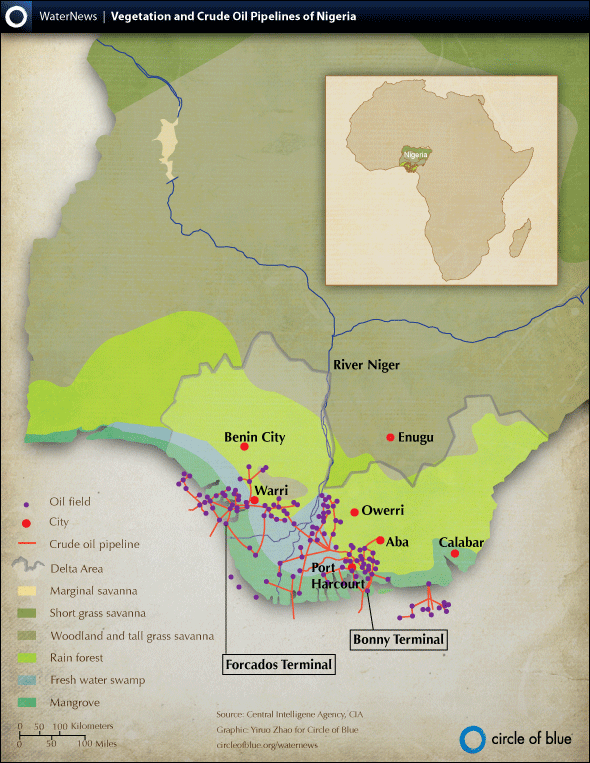
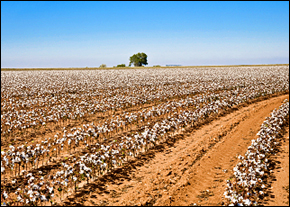


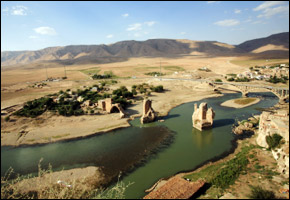

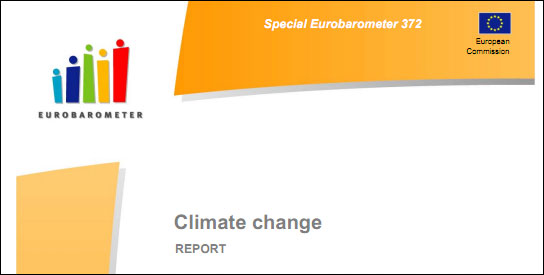


“Despite an estimated $600 billion in oil revenue since its discovery in 1956, the money does not appear to be economically trickling downstream.”
I’ve heard that the problem with world hunger lies not with the lack of food production, but with the lack of food distribution. Sounds like the same thing…
“One drop of oil can make up to 25 liters of water undrinkable. Last month, Amnesty International reported that residents of the Niger Delta bathe in and drink oil-contaminated water.”
Shocking statistic. The after effects will be felt for generations, even more so with foreign aid and journalists not being allowed in. Wonderful piece. Twittered.
Stephen
Most of the money earned in import/export must go back into import/export, or your partners in trade cannot continue to deal with you. The ability to employ the local citizenry often actually decreases due to available foreign money: things that should be produced locally are imported instead. A small amount of foreign money is good for a country. A large amount turns the blessing of a resource into a curse. Redevelop Nigeria’s oil for your own use. And do not be in a hurry to use it up. Nigerians of the future will have use for it too.
Trickle down can only come from the worker. Its main form is productive employment for other workers.
Excellent report. For all of us in the developed world, we need to find a way to intervene. Spectating is easy, and most of us just as easily carry on with our lives after reading news of atrocities around the world.
We need to find a way to intervene! Our Congress and President were elected to lead, so how can we bring this to their attention? How do we make humanitarian causes a priority?
Unfortunately, we throw our weight around internationally where it has the most benefit to Americans, and not the most benefit to humanity.
I appreciate the efforts taken by MEND,asking for the equitable distribution and development of Nigeria as a whole,and not region-wise.Nigerian Govt.should think and act on those lines,and no region should be left behind. It is hard to
get safe drinking water in the years to come,though Nigeria is the seventh largest exporter of black gold in the world,and the very same black gold is contaminating the fresh water sourses. Govt.should seriously give a thought to this.Most of the International fraudsters,languishing in Tihar Jail,New Delhi,India,
are from Nigeria.How sad and bad it is.Nigeria High Commission,in Delhi,India
and EFCC Nigeria,shoul be geared up to curb this menace,by strengthening the
hands of Govt.of India.Orelse Nigeria will lose its reputation in the comity of
Nations.Please arrange to give wide publicity in the print & electronic media.
With regards/Narasimharao,India